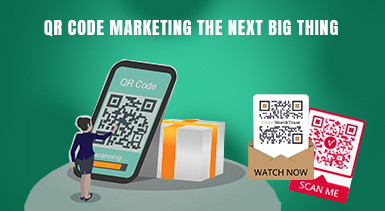Posted by Label Warehouse on 18th Aug 2023
QR Code Marketing: The Next Big Thing
In the age of digital connectivity and instant access to information, QR codes have emerged as a dynamic tool for marketers to bridge the gap between the physical and digital realms. QR code marketing, a rapidly growing trend, offers businesses a creative and interactive way to engage with consumers and deliver content seamlessly.
This blog explores the concept of QR code marketing, its benefits, applications, and strategies for successful implementation.
But first, let’s discuss-
What are QR Code Stickers?
QR code stickers are adhesive labels that incorporate Quick Response (QR) codes, which are two-dimensional barcodes that store information. These stickers are designed to be affixed to various surfaces, products, or materials, providing a convenient way for users to access digital content or information using their smartphones or tablets. When scanned with a QR code scanner app, these codes link users to websites, landing pages, videos, contact details, or any other digital content, creating a seamless bridge between the physical world and the digital realm. QR code stickers offer businesses a versatile tool for interactive marketing, promotions, information dissemination, and enhancing customer engagement.
Types of QR Code Stickers
QR code stickers come in various types, each catering to the specific needs and goals of businesses and individuals. These types offer versatility and customisation, enabling effective communication and engagement strategies. Here are some different types of QR code stickers:
URL QR Codes
These are the most common type of QR code stickers. When scanned, they direct users to a specific URL, such as a website, landing page, or online store. URL QR codes are ideal for driving online traffic, sharing information, or promoting products and services.
Contact QR Codes
Contact QR code stickers store contact information like name, phone number, email address, and even social media profiles. Scanning these codes allows users to easily save contact details to their devices.
VCard QR Codes
Similar to contact QR codes, VCard QR codes contain contact information in a virtual business card format. When scanned, users can save the details to their device's address book.
Location QR Codes
These QR code stickers provide directions to a specific location when scanned. Businesses can use them on marketing materials to guide customers to their physical stores, event venues, or offices.
Wi-Fi QR Codes
Wi-Fi QR code stickers simplify the process of connecting to a Wi-Fi network. When scanned, users are automatically connected to the specified network without the need for manual entry of credentials.
App Download QR Codes
Ideal for app developers, these QR codes lead users directly to the app store page for downloading a specific mobile application.
Product Information QR Codes
QR code stickers on products can lead customers to detailed information about the item, including specifications, usage instructions, and reviews.
Event QR Codes
Event QR codes on promotional materials or tickets provide attendees with event details, schedules, speaker bios, and registration links.
Feedback QR Codes
These QR code stickers encourage customers to provide feedback, reviews, or surveys by directing them to a feedback form or review platform.
Payment QR Codes
Popular in retail, payment QR codes enable customers to make instant payments by scanning the code with their mobile wallets.
Social Media QR Codes
These codes lead users to a specific social media profile or page, allowing businesses to grow their online following and engagement.
Video QR Codes
Video QR codes link to videos on platforms like YouTube or Vimeo, enabling businesses to share multimedia content with their audience.
Coupon QR Codes
Coupon QR codes offer users discounts, promotions, or special offers when scanned, encouraging immediate purchases.
Feedback QR Codes
Ideal for customer feedback, these QR codes lead users to surveys or feedback forms, helping businesses gather insights for improvement.
Dynamic QR Codes
These versatile QR codes can be edited after creation, making them suitable for scenarios where the content may change over time.
Benefits of QR Code Stickers for Businesses
QR code stickers offer a plethora of advantages that directly benefit businesses in diverse ways.
- Firstly, they provide a seamless and interactive means of engaging customers, bridging the gap between the physical and digital worlds. With a simple scan, QR code stickers direct users to websites, landing pages, or multimedia content, effectively enhancing customer engagement and fostering deeper connections.
- Additionally, QR code stickers enable businesses to track and analyse user interactions through data analytics. This valuable insight allows for a better understanding of customer behaviour, preferences, and engagement patterns, aiding in refining marketing strategies and optimising content.
- QR code stickers also facilitate streamlined processes, such as enabling contactless payments, event registrations, and feedback collection. This not only enhances operational efficiency but also caters to evolving consumer preferences for hassle-free interactions.
- Furthermore, the versatility of QR code stickers is unparalleled. They can be integrated into various marketing materials including print ads, packaging, posters, and product labels, creating consistent and impactful brand messaging across channels.
- From a cost perspective, QR code stickers offer a budget-friendly alternative to traditional marketing methods. They require minimal investment for potentially significant returns, making them an attractive option for businesses of all sizes.
- Ultimately, QR code stickers empower businesses to provide personalised experiences, boost brand visibility, and drive measurable results. By embracing this technology, businesses can tap into the modern consumer's desire for convenience, interactivity, and instant access to information, fostering stronger customer relationships and propelling growth in today's digitally-driven landscape.
QR Code Marketing: An Overview
QR (Quick Response) codes are two-dimensional barcodes that can store a significant amount of data, including URLs, contact information, app downloads, and more. QR code marketing involves integrating these codes into various marketing materials to provide users with easy access to information, promotions, and interactive experiences using their smartphones or tablets.
The Benefits of QR Code Marketing
Instant Engagement: QR codes enable users to access content instantly by scanning the code with their mobile devices. This eliminates the need for typing long URLs or searching for specific information.
Enhanced Customer Experience: By offering convenient access to relevant content, QR code marketing enhances the customer experience, making it more engaging and interactive.
Trackable Analytics: Marketers can track and measure the performance of QR codes through analytics, gaining insights into user behaviour, scan rates, and conversion rates.
Cross-Media Integration: QR codes seamlessly integrate with various marketing channels, including print materials, packaging, signage, and digital platforms, allowing for consistent messaging across touchpoints.
Cost-Effective: Implementing QR codes is relatively cost-effective compared to traditional advertising methods. They provide a direct link between offline and online campaigns without the need for extensive resources.
Applications of QR Code Marketing
QR code marketing isn't limited to just one use case — it offers versatile applications across industries and platforms. From boosting product engagement to enhancing event experiences, QR codes open up a world of interactive marketing possibilities.
Product Information
Attach QR codes to products to provide users with instant access to detailed information, specifications, and usage guidelines.
Promotions and Discounts
Deliver exclusive promotions, discounts, or coupon codes to customers who scan QR codes, encouraging immediate purchases.
Event Promotion
Use QR codes on event materials to provide attendees with schedules, maps, speaker bios, and registration details.
Lead Generation
Use QR codes to direct users to a landing page where they can provide contact information in exchange for valuable resources.
Interactive Advertising
Incorporate QR codes into print ads to provide additional content, videos, or interactive experiences related to the advertisement.
QR Code Marketing Strategies for Success
To maximize the impact of your QR code campaigns, it’s essential to go beyond simply placing a code on a product or flyer. Successful strategies focus on delivering value, optimizing user experience, and tracking performance for continuous improvement.
Provide Value
Ensure that the content users access via QR codes offers real value, whether it's informative, entertaining, or beneficial in some way.
Mobile Optimisation
Ensure that the content linked to the QR code is optimised for mobile devices, offering a seamless browsing experience.
Clear Call to Action
Include a clear and compelling call-to-action alongside the QR code to encourage users to scan it.
Placement Matters
Strategically place QR codes where they are easily visible and accessible to the target audience.
Testing and Tracking
Test QR codes across different devices and platforms to ensure compatibility. Use analytics to track user engagement and refine your strategies based on the results.
Conclusion
QR code marketing is a powerful tool that empowers businesses to connect with consumers in innovative ways. By seamlessly integrating the physical and digital realms, QR codes enhance engagement, deliver relevant content, and create memorable experiences. Whether used for product information, promotions, event engagement, or lead generation, QR codes have the potential to revolutionise the way businesses interact with their audience. By implementing effective QR code marketing strategies, businesses can tap into this dynamic trend to enhance their brand visibility, customer engagement, and overall marketing effectiveness.
If you are looking for premium QR code stickers at the best prices online, Label Warehouse is your one-stop shop. Browse through our selection and shop for the perfect QR code sticker for your business today!

